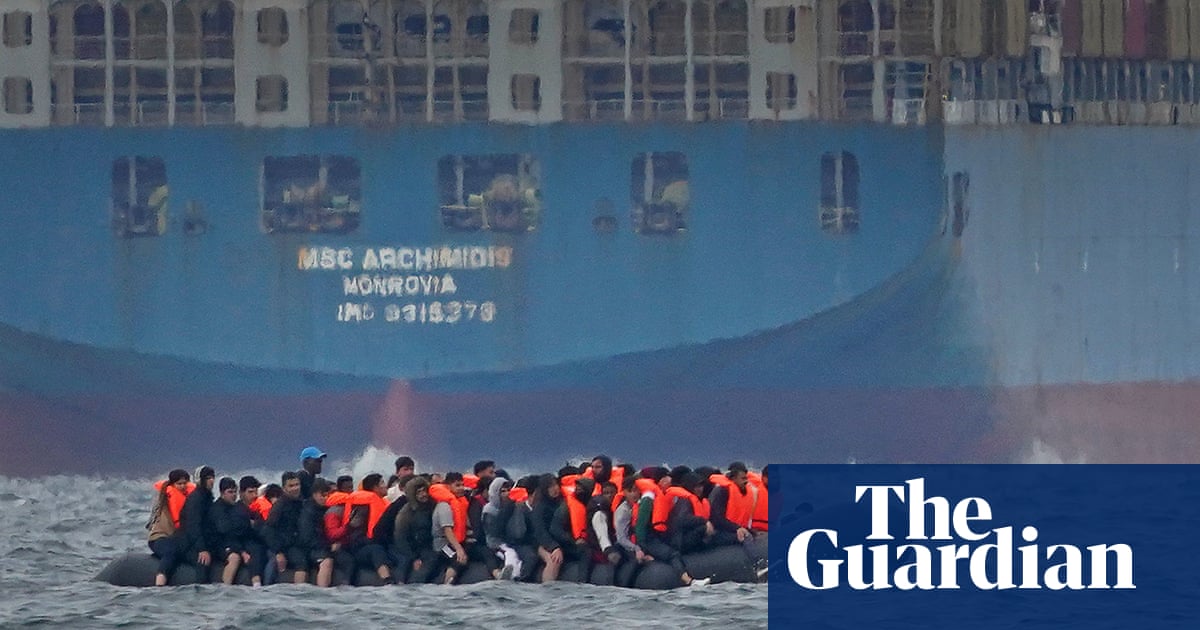
The UN refugee agency has said “a clear majority” of people arriving in the UK by small boats across the Channel should be considered to be refugees, in a challenge to the home secretary, Priti Patel.
Patel told MPs and peers last year that 70% of people making the crossing were “single men who are effectively economic migrants”, and the government has repeatedly referred to them as “migrants”.
The United Nations high commissioner for refugees (UNHCR) told the Guardian that those travelling by small boat to the UK should be considered to be asylum seekers or refugees, and not migrants.
Home Office staff are this week sending out the first formal removal letters to people who have arrived in small boats, warning them they will be sent 4,000 miles away to Rwanda. The first plane is supposed to leave the UK for the east African state in two weeks.
The policy is explicitly focused on people who arrive via so-called “irregular” routes, such as in small boats across the Channel or hidden in lorries.
The UNHCR said the government’s data challenged claims that most people travelling to the UK by small boat were economic migrants. “Based on currently available Home Office data, UNHCR considers that a clear majority of those recently arriving to the United Kingdom by boat are likely to be refugees. Refugees and asylum seekers are not, and should not be described as, ‘migrants’,” the spokespesaid.
“Access to asylum should never be contingent on mode of arrival or nationality. Equally, the only way to establish whether people are refugees is through a fair and efficient determination of their claims, for which the UK has a clear responsibility.”
Appearing before the Lords home affairs and justice committee in November, Patel was questioned about her new policy of deeming the asylum claim of any person who arrives in the UK after passing through a “safe” country as “inadmissible” – meaning their claim will not be considered.
Describing the people who would fall into this category, she said: “In the last year, 70% of individuals on small boats are single men who are effectively economic migrants. They are not genuine asylum seekers.”
Asked to justify Patel’s figures at the time, a Home Office source said that of 8,500 people arriving by small boat in 2020, 87% were men and 74% were aged between 18 and 39 – but they did not provide evidence related to their asylum claims.
A new analysis of the government’s latest data shows that 77% of the men, women and children who come across the Channel in small boats are likely to be refugees and would accordingly be allowed to remain in the UK if their claims were assessed.
That figure, or grant rate, is calculated using recent government data showing small boat arrivals from the top 20 countries of origin between January 2021 to March 2022, and a separate spreadsheet showing the numbers from each country over the same period who are granted refugee status or other forms of protection and the number from each country who are refused.
The weighted average grant rate for boat arrivals for January 2021 to March 2022 was 77%, according to the analysis.
Data also shows that 1,094 Afghans arrived by small boat between January and March this year, after the fall of the Taliban last August. That compares with 1,323 Afghans arriving across the Channel in the whole of 2021. The grant rate for Afghanistan between January 2021 and March 2022 was 88%.
More than 600 Syrians have arrived by small boat since January, official statistics show, compared with 776 in 2021. The grant rate for Syria between January 2021 and March 2022 was 99%.
When the deal with Rwanda was announced on 14 April, Boris Johnson claimed it would result in thousands of people being sent there to have their claims processed. Ministers hoped to see early evidence that the proposition of being sent to Rwanda would break the business model of people-traffickers operating in the Channel.
More than 4,850 people have reached the UK in small boats since 14 April, more than two and a half times the number that crossed in the same period last year, and maintaining the same pace of increase seen since the beginning of the year.
A Home Office spokesperson said: “Our world-leading partnership with Rwanda is a key part of our strategy to overhaul the broken asylum system and break the evil people-smugglers’ business model. We have now issued formal directions to the first group of people due to be relocated to Rwanda later this month, where they will be given the opportunity to rebuild their lives there. Only those with inadmissible asylum claims who have made dangerous, unnecessary and illegal journeys will be relocated and to suggest otherwise is wrong.”












